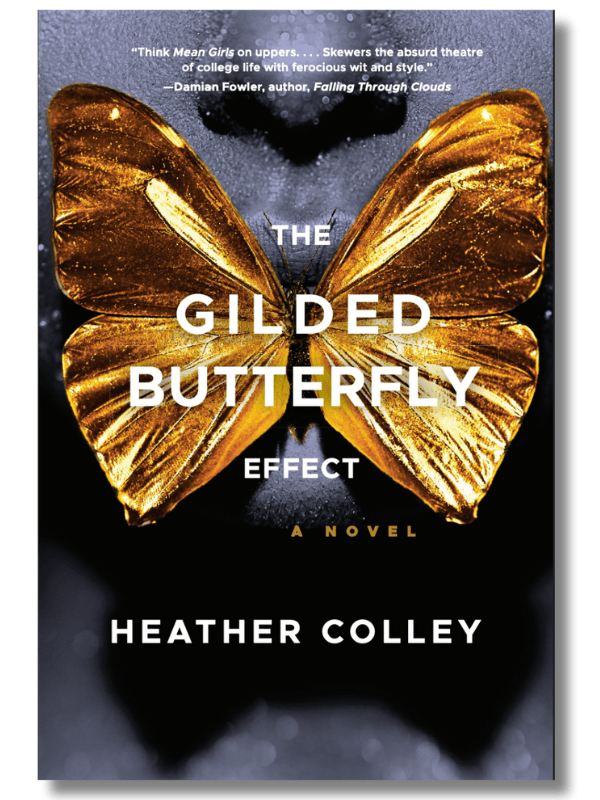The Gilded Butterfly Effect
by Heather Colley
Genre: Literary Fiction
ISBN: 9781953103628
Print Length: 276 pages
Publisher: Three Rooms Press
Reviewed by Victoria Lilly
Raw, witty, and irreverent—a sharp interrogation of the rust that lies beneath the gilded cage of the glamorous sorority life
Stella’s life as a sophomore sorority sister at the University of Michigan is a revolving door of alcohol, drugs, loud music and louder giggling. Yet the glamor and the brazen self-confidence are entirely hollow. Since the previous spring, Stella has been spiraling into depression and self-destruction, fueled by an unnamed trauma. Her mother considering her daughter’s issues a nuisance and her therapist droning over scripts oblivious to her patient’s true issues, Stella digs herself deeper one destructive party after another.
Things change when Penny, a lonely and deeply insecure student from New York, hitches a ride to Michigan looking for her former best friend. Instead Penny bonds with Stella, the only girl among the roster of fashion-magazine-perfect sorority beauties who takes note of the newcomer. Penny’s earnestness and humanity single her out in the world of plastic smiles and drug-fueled vapidity, and Stella begins to change through their friendship. She even begins a seemingly healthy and happy romance with a kind fraternity boy. But the college world which they inhabit begins to suck Penny into its vortex, while Stella struggles to escape it. In this swirl of feelings, drugs, and secrets, their blooming friendship is put to the test.
The Gilded Butterfly Effect is a gripping portrait of the dark underbelly of the American college experience and of the contrasting faces of female friendship. Through a tangled web of relationships and deft use of style and point-of-view, Heather Colley exposes the toxic undercurrents of college culture: addiction masked as glamor, misogyny cloaked as tradition, and the brutal demands placed on young women to perform beauty and conformity. The “butterfly effect” of small decisions—joining a party, trying a pill, befriending the wrong person—ripples outward into moments of crisis and self-reinvention.
Probably the strongest element of the novel is its style. Colley’s prose vividly immerses the reader in the drug- and liquor-fueled haze of inane college parties; in the neurotic psyche of its protagonists; and in the tense and tender moments of vulnerability between them, when courage to be earnest overcomes numbness or anxiety.
The prose gives each point of view character a distinct presence: Stella’s voice brims with bravado, cynicism, and (initially) performative cruelty, while Penny’s narrative is more introspective, vulnerable, and drenched in profound insecurity. By digging deep into the heroines’ inner worlds, the story creates a rich and tumultuous experience out of the repetition and the haze and the superficiality of the parties and hookups and constant drug abuse that comprise Stella’s and Penny’s lives.
The inanity of the “fun” college experience and sorority socialization is painted with marvelous realism, as are the mental health problems of the heroines. Stella’s body-image issues and eating disorders are some of the most compelling aspects of the novel, as well as her relationship with her careless mother Minnie. Child-parent relationships and the generational recreation of the sorority/fraternity lives are other strong points of the story, with events such as the parental visit to the university a delightfully depressing punctuation of the regular rut of college life.
Colley also succeeds in capturing the many contradictions of young adult femininity. The sorority house, a space marketed as a supportive sisterhood, becomes instead a crucible of competition, self-destruction, and quiet violence. Stella, in particular, embodies the paradox of empowerment and entrapment: she wields her charisma to dominate social hierarchies, yet her dependency on drugs and male validation renders her fragile. Penny, meanwhile, represents an “imperfect” outsider’s desperate longing to belong to a world of fun and glamor—she yearns to be seen, admired, and desired. Their entanglement illuminates how friendships between young women can oscillate between intimacy and rivalry, tenderness and cruelty, often within the same breath.
At once jarring and hypnotic, The Gilded Butterfly Effect deploys witty and flowing prose to provide a sharp and bleak examination of femininity, friendship, and coming into adulthood. It grapples with evergreen themes from a fresh angle and does not shy away from touching upon dark and traumatic subject material. Colley demonstrates a gift for inhabiting multiple voices and rendering a world that feels simultaneously grotesque and magnetic. This novel is neither easy nor comforting. However, its willingness to dwell in the messy realities of girls coming into womanhood under the seductive lights of hedonism and male attention are sure to leave a lasting impression.
Thank you for reading Victoria Lilly’s book review of The Gilded Butterfly Effect by Heather Colley! If you liked what you read, please spend some more time with us at the links below.
The post Book Review: The Gilded Butterfly Effect appeared first on Independent Book Review.
